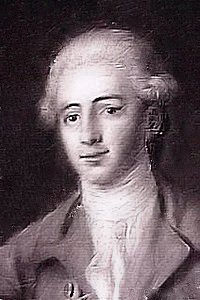Introduction
Born: 1726, Sundridge, Kent, England.
Died: January 2, 1792, Canterbury, Kent, England.
Buried: Canterbury Cathedral, Kent, England.

Born: 1726, Sundridge, Kent, England.
Died: January 2, 1792, Canterbury, Kent, England.
Buried: Canterbury Cathedral, Kent, England.

Perronet was the son of Anglican minister Edward Perronet, vicar of Shoreham, Kent. His family descended from French Huguenots who fled the continent to escape religious persecution.
For a time, Perronet was a co-worker of John and Charles Wesley.
Perronet spent the end of his life at a Congregational church in Canterbury.
Charles Wesley wrote this upon Perronet’s death:
Here lies, who late an living emblem lay
Of human greatness, in a tent of clay;
A pilgrim, wandering through this desert wild,
Weak as a reed, and helpless as a child:
Whose strengthened arm
By faith untaught to yield,
Oft foiled the Tempter, and maintained the field.
In wars without, in warring fears within,
He conquered terror as he conquered sin;
Looked for himself to Him, whose potent breath
Can light up darkness, or extinguish death:
Dart from his eye destruction on the foe,
And make hell tremble as she hears the blow:
He looked and found what all who look receive,
Strength to resist, and virtue to believe;
The tender chastenings of a Father’s rod:
While thus corrected, as by pain refined
The dross is left—no more his spirit mourns,
But spreads her wings, and to her Ark returns;
Great Ark of Rest—the sufferer’s bright abode;
The arms of Jesus, and the Ark of God.
Mr. Wesley had long been desirous of hearing Edward Perronet preach; and Mr. Perronet, aware of it, was as resolutely determined he should not, and therefore studied to avoid every occasion that would lead to it.
Mr. Wesley was preaching in London one evening, and seeing Mr. Perronet in the chapel, published, without asking his consent, that he would preach there the next morning at five o’clock. Mr. Perronet had too much respect for the congregation to disturb their peace by a public remonstrance, and too much regard for Mr. Wesley entirely to resist his bidding.
The night passed over. Mr. Perronet ascended the pulpit under the impression that Mr. Wesley would be secreted in some corner of the chapel, if he did not show himself publicly, and, after singing and prayer, informed the congregation that he appeared before them contrary to his own wish; that he had never been once asked, much less his consent gained, to preach; that he had done violence to his feelings to show his respect for Mr. Wesley; and now that he had been compelled to occupy the place in which he stood, weak and inadequate as he was for the work assigned him, he would pledge himself to furnish them with the best sermon that ever had been delivered.
Opening the Bible, he proceeded to read our Lord’s Sermon on the Mount, which he concluded without a single word of his own by way of note or comment. He closed the service with singing and prayer. No imitator has been able to produce equal effect.
Quoted in Duffield, pp.17-18